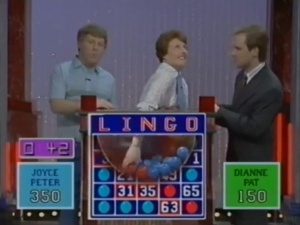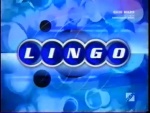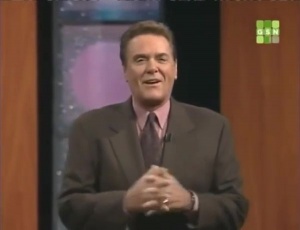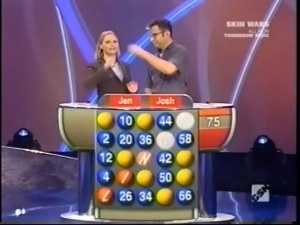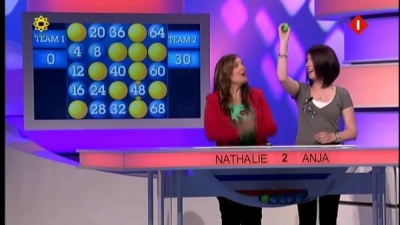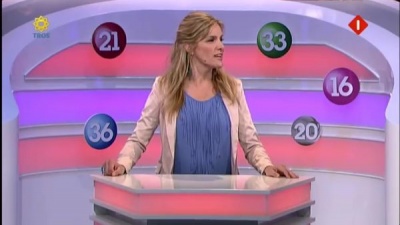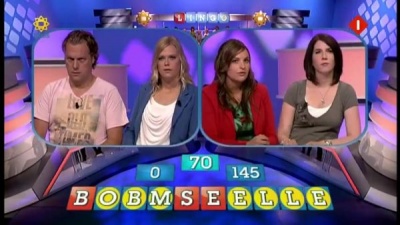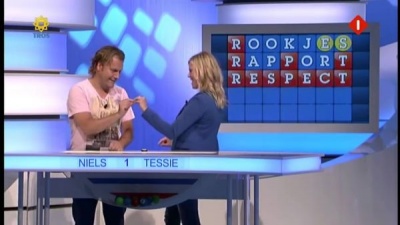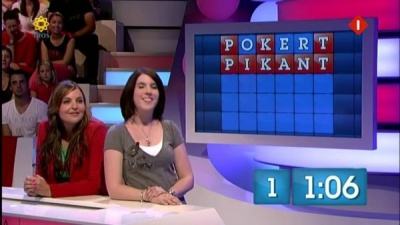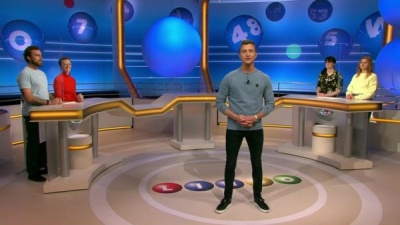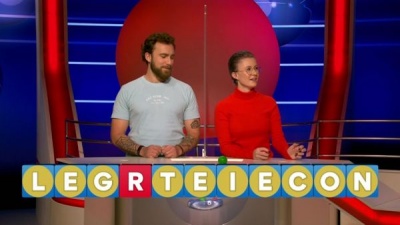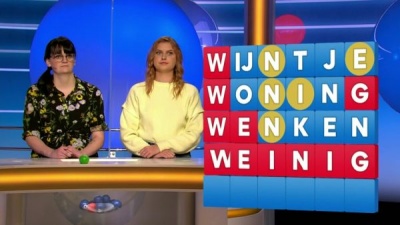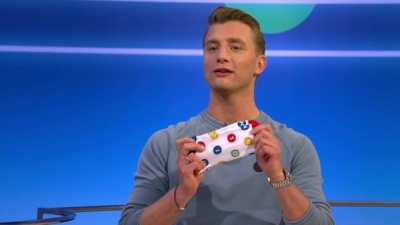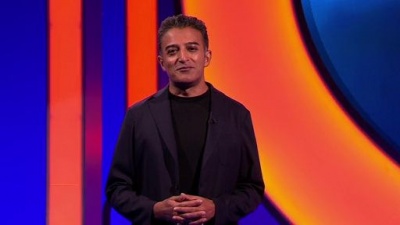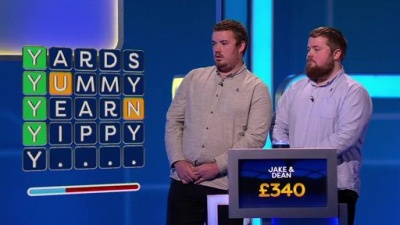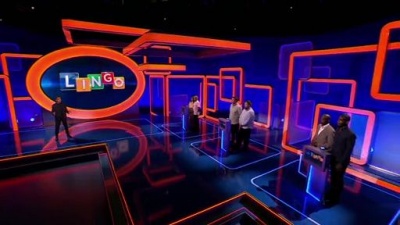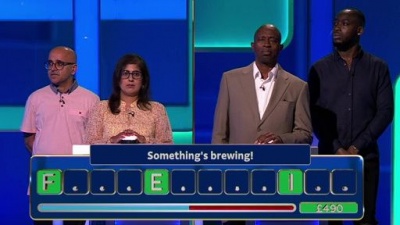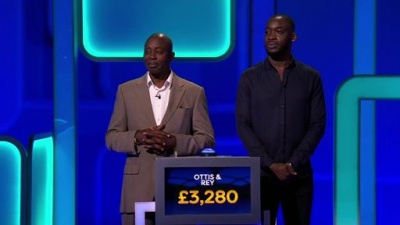Weaver's Week 2021-01-31
Last week | Weaver's Week Index | Next week
Last week, we looked at the founding of Lingo by Ralph Andrews, and how it became a big hit in Dutch-speaking areas.
Lingo is a very simple game. Guess a five-letter word: you're given the first letter, and any guesses that are in the right place, or those somewhere else in the word. Each word solved is worth some cash itself, and allows you to draw two balls from a bingo bag. There's an extra prize for a line on the card.
But the bonus round never quite felt right. While the main game was about drawing balls to make a line, the bonus was about drawing balls to … not make a line. It guarantees a tense finish, but feels artificial.
Nevertheless, Lingo had become a huge success. It held down a regular slot at 7pm, a high-profile slot after Een Vandaag (a bit like The One Show). For the new century, the show moved broadcasters from the left-wing VARA organisation to the pure entertainment specialists TROS. As well as a new host, there was a new final round.
To explain the new finale, we'll invoke one of the most trusted and familiar faces in game show history.
Contents |
Lingo 2000
What's up, chuck?
Cable channel GSN brought Lingo back from 2002-07, with host Chuck Woolery. It's a slicker show: the players are trusted to read out their own bingo balls, we don't need a hostess popping up every few moments.
The game is played for points: 25 for a word, 50 for a line. Points were doubled after about six minutes of play, and the team with the highest score after a further six minutes is the day's winner.
Only about twelve minutes of main game play? That's quite enough for anyone: Lingo moves at an incredible pace, they'll solve a word and draw a ball at least once a minute.
There's a very different bonus game for the day's winners. As before, they see two of the five letters in each word; if they wish, the players can call on Bonus Letters. They've earned a bonus letter for each line in the first round, plus one for making the final.
Two minutes of play in this round, and each word guessed allows the team to draw one number, and hope to make a line on the final card. $5000 (€3800) if they achieve this feat, with a bonus prize if they make a line from their first pick.
Naar de toekoemst!
As with almost any long-running show, Lingo has dropped catchphrases into the culture. The early game gave us "niet op de bord!" when the players pulled a ball that was not on the board. That was lost with the new finals format, but the downbeat "rode ball" and the upbeat "grone ball!" would be shouted when they came out of the hopper.
Our tour reaches 2012, when they've stepped into the Futuristic Zone, white and bright, with the word grids appearing (gasp!) behind the players. €20 for each word guessed, still €100 a line on the board.
And (gosh!) a new round! The "tien letter word" round is, as the name suggests, giving clues to a ten letter word. It's shown as an anagram, and a disembodied voice gives a clue to what the word is. As time ticks on, more letters are slotted into position, and the number of points available falls. One buzz per team, and a right answer earns €10 for each letter out of position. After this, a chat with the players – it's no longer a tune-out point at the start.
Then (shock!) the words go up to six letters!! Are there any six letter words in Dutch? Slapen, that's one, to sleep. Lenzen, the things they make eyeglasses out of. Praten, to talk, to prattle. Smerig, that's smutty. Yes, there are plenty of six letter words in Dutch. They're worth €25 when guessed. There are even some seven letter words, though we have have difficulty translating some of them.
Teams also get one challenge per game. Buzz in while your opponents are playing, solve the word at once, earn €100 and take control. Gosh!
And there's a new final round. Two and a half minutes to solve some difficult six-letter words, each one solved gives one pull in the final. Unlike the version they played on GSN, no bonus letters are available. The daily prize by this time is €5000, plus €1000 for each word solved in the final. A pink ball adds a bonus prize to the main game winnings. And there's a silver ball – pick that out and our winners can stop right now for half the main prize. Great when it's the last ball out.
Lucille Werner is the host, a producer-turned-presenter, and later the Alexander Armstrong on the local version of Pointless. She's got a tremendous rapport with the contenders, knows the game inside out, and lets it roll in whatever direction it goes. Words in the dictionary that nobody's ever heard of? A disembodied voice will explain them, Lucille joshes with the voice, and the game continues.
One should never change a winning formula, except one must. Lingo lost its place of NPO1 and slipped down to NPO3 – it's like a show here moving from Channel 4 to More4. Viewers lost the thread of the game, and stopped watching. Lingo came off air in 2014.
You can't keep a good show down. Lingo returned on private channel SBS6 in 2019. That's the channel owned by the Talpa group, John de Mol's company. He knows a good game show when he sees one. Let's review a sample episode.
Lingo on SBS6
Reviews' based on the broadcast of 13 January 2021
Two teams of two are in the Lingo studio, arranged at the ends of a wide semicircle. Our host stands in the middle of the floor. Lingo has always been a casual show, and Jan Versteegh's outfit is exactly what the modern host wears – jumper, jeans, trainers.
Lingo doesn't hang around: in 45 seconds, we've met the teams, seen the opening titles, had a bit of a chat, and we're into the first word. 45 seconds! The Dutch culture is known for its directness, and here it gets the show off on the b of the bang.
There's a thin screen of clear plastic between the players on each team. It's a very thin strip, and we almost missed it entirely. The other nod to «wat met een ding en een ander» is how just one player from each team pulls out the balls, which they'll mark off on... the «elf letterwoord».
Yes! They've done away with the bingo card in normal play, and replaced it with an eleven letter word. All of the right letters, not necessarily in the right order. The team pulls out a ball: if it's a letter, it's put in the right position in the word. The team's got a short time to guess after seeing each letter.
The bag still contains grone ballen for the jackpot, and rode ballen to pass play to the other side. These are marked by the studio lights, change to green or red. Usually, the show is lit in blue with gold highlights.
The game continues: there's a debate about whether "tuned" is a valid Dutch word (it's not) and what "tubes" means (verb, to put your video up on the internet). Though this column finally has enough Dutch to play along with the shorter words, and we can guess what "citroengele" means (lemon yellow), we're as stumped as anyone by puzzle words like "bontkraagje" (fur collar).
Rather than talk to the contestants before the game starts, they talk with one team a few minutes before the commercial break and the other shortly after. The commercial break? Yes, SBS6 is a commercial channel, and will interrupt its shows for adverts. Wouldn't catch the NPO doing that: their channels only show adverts between the programmes.
The game still progresses through 5-letter words, then 6-letter words, and finishes with alternating guesses at a 7-letter monster. This causes a lot of pausing, passing, and bonus letters. All main game words are for €15, and add €100 to the day's jackpot, which doesn't roll over. After a team's got their puzzle word for €100, it's replaced by a more difficult example – a twaalf letterwoord, and if they solve it, one of 13 letters appears. Rather naughtily, the show doesn't solve puzzle words left hanging at the end of the game.
The losing team take away whatever money they won in the game, plus an exclusive pair of Lingo socks. The winning team go on to play the finale – 2 minutes 30 solving six-letter words against the clock, each one correct allows one ball from the bag to complete the Lingo board and win €5000. It's the only element of the game involving the traditional bingo board.
Lingo doesn't stop: it's 22 minutes of fast-paced action. You can't just watch Lingo, you've almost got to shout for the words. "Idereen! Anyone can see it's idereen!" Or just cheer for the right balls to come out, even people with no grasp of Dutch can do that.
De Britse-variant
Wildcard Television (part of Objective Media, a component of All3Media) for ITV, 13 January 2021
Two hours earlier, ITV aired its own version of Lingo.
Adil Ray hosts, he's in a jacket and shirt, and we never get enough of a close-up to see his shoes. He begins the show by talking to the contestants. This variant runs for a full hour and has three teams playing at the start. He also has to explain how the game of Lingo works, by means of an example.
By talking to the contestants and running through the rules, and explaining how the first round will work, it's over 4 minutes until the game begins in earnest. By any standards, that's far too much faffing about. The rules spiel has to go at the top of the show, but perhaps we only need to meet one of the teams before they play.
The first round is assigned words, four letters long. For each one they solve, the team banks £200 and pulls – nothing! They've managed to lose their balls in transit! Yes, ITV's version of Lingo lacks the key defining element that makes Lingo Lingo – the bingo element. It's a bizarre decision, like having Supermarket Sweep and not booking a trolley.
Anyway, the game continues. Each team finishes with a puzzle word, ten letters long, and with a brief definition. The team is given the first letter, but no others. As time goes on, more letters are added – and always in the correct place – but the money reduces with each letter. They've ten seconds to buzz in and give an answer. A potential £300 if the team gets it straight away, and only one guess is allowed.
All three teams have their round in turn – and this takes time, it's almost ten minutes between the brief chat with the furthest team and when they start playing.
What are the local variant rules? Ten seconds are allowed for each answer, and the usual five guesses for each word. Fail to answer in the allowed time, or give something that isn't a word, and that particular word is lost at once – it's not passed over, there's no bonus letter for the other teams. While it's not a strict rule, host Adil Ray will tend to say something apposite about each guess "are you NAIL-ed on for it?" before revealing the letter pattern. His best joke is before the final: "Can they lingo all the way?"
ITV is a commercial channel, and puts adverts in the middle of its shows. Round two is similar to the first, except the words are now five letters long and worth £300. If the word is unguessed (five errors, out of time, non-word) the other teams can buzz in for the money. The puzzleword is now an elf letterwoord, worth £400 at the start – this can also be taken by the other sides if the assigned team gets it wrong.
At the end of this round, the team with the least money leaves the game. They might have £640 on their podium, but the team leaves with nothing. Not the cash on their podium, not the Lingo rucksack, not even a Lingo pair of socks.
The two remaining teams now play a traditional game of Lingo, right? Wrong. The teams split in two – one will play the four-letter words, the other has five-letter words. This round starts at £500 for a first-guess solve, reducing by £50 for each solve, ending at £300. Each player starts two words in their category. There's a twelve-letter puzzleword on the buzzers, starting at £750.
Again, the team with the less money leaves the show with nothing. That £3080 on your podium? It's just numbers, and this is a show about words. Not numbers.
Our winning team usually takes in about £3000 (€3400) to the final. If they can solve one four-letter word, they'll win half that money. Solve a five-letter word as well, they'll scoop the lot. Add in a six-letter word, the prize will be doubled. Only 90 seconds of playing time, and our players only see one letter in each word - not the two as in every other final we've seen. They can pass on a word if it proves intractable.
Even before seeing other versions, we reckoned ITV's Lingo was a bit slow, and a bit samey. It's a commercial hour (43 minutes of actual programme) with about 30 minutes of game. There are a lot of words in the English language, and it's not unreasonable to allow ten seconds to think about each answer. When a team uses all that time, the pace really falls off.
And it gets worse. Adil makes an effort to fill the dead air with some noise. This is rarely welcome – the puns are weak and obvious – and sometimes he actively distracts. "Get ready to steal, Bill," as time runs down. That's both a distraction from Alice's thinking and a subtle indication she should not answer while Adil speaks.
The producers of Lingo have done their best to dress up the different rounds, but it is now almost entirely the one game, repeated for the entire duration. Winning Combination interspersed general knowledge trivia with category boards, Tipping Point splits its questions up with coins in the machine, and The Chase has strong characters to play off. Lingo needs something else, and we suggest the best answer would be to pull out letters for the "puzzle word". No jackpot, no red balls, just one letter for each word guessed correctly.
In other news
The Riddler is a weekly mathematics puzzle from stats-and-news site 538. This week's puzzle asks for the optimal set of words in an idealised version of Lingo – if you could guess any word in your first four guesses, which words give the most information for the fifth and final go? Riddler Nation will publish the answer next Friday.
Buried talents There's going to be no new series of Got Talent on ITV this year. A statement from the broadcaster said, "Not only is it not possible to film auditions with [many] types of acts in a secure way but also that they are not able to adequately rehearse and prepare safely. Safety has to come first and, as a result, the recording of the show can’t currently go ahead as planned." Terribly sad news, but it is for the best. ITV and Thames intend to mount a full series next year.
What will fill the gap? We don't know, but offer ITV mashup programme I'm Penny a Masked Tipping Celebrity Catchphrase on Ice... Chase me Rolling Out of Here!
Van Out Denise Van Outen withdrew from Dancing on Ice after injuring her shoulder during training. She's replaced in the ITV contest by gymnast Amy Tinkler and professional skater Joe Johnson.
Alan Carr takes over Interior Design Masters (BBC2, Tue), and Mel Giedroyc asks for the most Unforgivable sin (Dave, Tue). It's also the final of Mastermind Cymru (S4C, Wed). Joel Dommett hasn't been on Saturday night telly for ages; he's on Catchpoint Celebrities (BBC1) next week.
We don't intend to publish next week, and expect to return on 14 February with a review of BBC2's Lightning.
Photo credits: IDTV, Wildcard Television.
To have Weaver's Week emailed to you on publication day, receive our exclusive TV roundup of the game shows in the week ahead, and chat to other ukgameshows.com readers, sign up to our Google Group.

